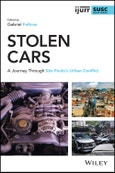Stolen Cars is an innovative ethnography of urban inequalities and violence in São Paulo, Brazil.
- Organized around the journeys of five stolen cars, each chapter discusses a specific theme, such as the distinctions between violent robbery and the more commercial non-violent theft or the role of national borders interconnecting illegal and legal economies
- Provides an original theoretical framework for a rarely studied urban and transnational supply chain
- Draws from empirical data and a combination of different methodologies to demonstrate mechanisms of urban inequalities and violence reproduction
- Highlights how everyday life is entangled with structural urban transformations
- Uses an ethnographic narrative to show how urban development produce various forms of illegality and violent crime
Table of Contents
Notes on Contributors viii
Series Editors’ Preface x
Introduction 1
Gabriel Feltran
A Phone Call 7
A Global Market 9
Theoretical Framework: Normative Regimes 11
Inequalities 18
Methods: About Journeys, Tacking, and Our Collaborative Research Team 21
A Collective Research Team 27
Ethical Issues, Diversity, and Typical Days 29
Chapter Structure 31
1 Crime, Violence, and Inequality in São Paulo 37
Gregorio Zambon and Gabriel Feltran
7 a.m. (Fiat Strada) 39
10:00 a.m. (Hyundai HB20) 43
5:15 p.m. (Fiat Palio) 47
8:40 p.m. (Ford Ka) 53
Urban Violence and Market Regulation 56
2 State Reaction 63
Gabriel Feltran
Police Use of Lethal Force 66
Imprisonment 74
The “Clearing of Public Roads” 78
Political Legitimation 80
3 Designing the Market 87
Deborah Fromm
Insurance as a Mediator 94
The Automobile Business: From the Streets of São Paulo to the Panama Papers 99
4 Auctions and Mechanisms 104
André de Pieri Pimentel and Luiz Gustavo Simão Pereira
Central Circuits: Insurance Companies that Sell at Auctions 109
Some Numbers 111
Marginal Circuits: Car Dealerships and Chop-shops that Buy at Auctions 115
Auctioneers: Economics and Politics 121
5 Dismantling a Stolen Car 127
Isabela Vianna Pinho, Gregório Zambon, and Lucas Alves Fernandes Silva
Family, Market, Politics 130
Between Extremes: From “Recicla” to “Sheds” 135
Prices and Stratification 143
6 Regulating an Illegal Market 147
Luana Motta, Janaina Maldonado, and Juliana Alcântara
A Brief Chronology of the Dismantling Law 149
Old Practices, New “Political Merchandise”: The Everyday Experience of the Dismantling Law 152
The Political Centrality of Police Officers 158
Police Regulation and Violence 161
7 Not Criminals, Legislators 165
Deborah Fromm and Luana Motta
New Laws, New Markets 169
Illegal Markets, Microfinance, Corporate Philanthropy 171
Action and Reaction 174
Parallel Insurance and the Protection Market 175
The Law that Governs the Market, the Market that Governs the Law 181
8 Globalization and Its Backroads 187
André de Pieri Pimentel, Gabriel Feltran, and Lucas Alves Fernandes Silva
A Global Market and Its Margins 190
Connecting Markets 194
Urban Reconfigurations 198
North-South Urban Inequalities 202
Conclusions 208
Gabriel Feltran
Afterword: Following Cars in a Latin American Metropolis: Inequality, Illegalisms, and Formalization 220
Daniel Veloso Hirata References 228
Index 245








